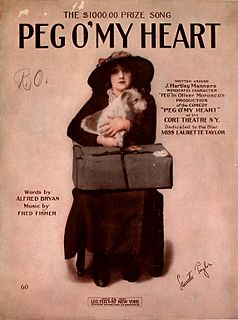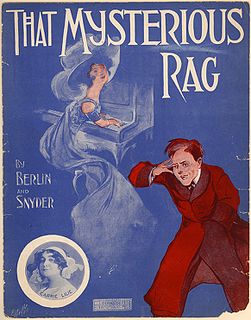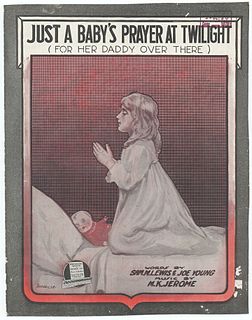
"San Francisco Bound" is a song by Irving Berlin, published by the Berlin & Snyder Company in 1913. The sheet music's cover proclaims that it was "successfully featured by Amy Butler". A recording by the Peerless Quartet was popular in 1913. [1]

"San Francisco Bound" is a song by Irving Berlin, published by the Berlin & Snyder Company in 1913. The sheet music's cover proclaims that it was "successfully featured by Amy Butler". A recording by the Peerless Quartet was popular in 1913. [1]

"Peg o' My Heart" is a popular song written by Alfred Bryan (words) and Fred Fisher (music). It was published on March 15, 1913 and it featured in the 1913 musical Ziegfeld Follies.

Robert Thomas Freeman was an American rock, soul and R&B singer, songwriter and record producer from San Francisco, best known for his two Top Ten hits, the first in 1958 on Josie Records called "Do You Want to Dance" and the second in 1964 for Autumn Records, "C'mon and Swim".
"There's No Business Like Show Business" is an Irving Berlin song, written for the 1946 musical Annie Get Your Gun and orchestrated by Ted Royal. The song, a slightly tongue-in-cheek salute to the glamour and excitement of a life in show business, is sung in the musical by members of Buffalo Bill's Wild West Show in an attempt to persuade Annie Oakley to join the production. It is reprised three times in the musical.
"All Alone" is a popular waltz ballad composed by Irving Berlin in 1924. It was interpolated into the Broadway show The Music Box Revue of 1924 where it was sung by Grace Moore and Oscar Shaw. Moore sat at one end of the stage under a tightly focused spotlight, singing it into a telephone, while Oscar Shaw sat at the other, doing the same.

"I Can Hear Music" is a song written by Jeff Barry, Ellie Greenwich and Phil Spector for American girl group the Ronettes in 1966. This version spent one week on the Billboard Pop chart at number 100. In early 1969 American rock band the Beach Boys released a cover version as a single from their album 20/20 (1969), peaking at number 24 on the Billboard Hot 100.
"Heat Wave" is a popular song written by Irving Berlin for the 1933 musical As Thousands Cheer, and introduced in the show by Ethel Waters.
"The Big Hurt" is a pop song that was a hit for Toni Fisher in 1959. The song was written by Wayne Shanklin. "The Big Hurt" is notable because it featured phasing effects which at that time were rare in popular music; DJ Dick Biondi on WKBW would introduce the record as "Toni Fisher's weird one."

"When I Lost You" is a song with music and lyrics by Irving Berlin. It was written in 1912 after his wife of five months, the former Dorothy Goetz, died of typhoid fever. In it he poured out the grief of his loss; it was the only song that he ever admitted had such a connection to his own life. The song, a ballad, was unlike any of Berlin's previous songs, which were upbeat tunes written to take advantage of the dance craze. The song is in a slow waltz tempo. It became Berlin's first hit ballad.
"I'm Alabama Bound" is a ragtime melody composed by Robert Hoffman in 1909. Hoffman dedicated it to an M. T. Scarlata. The cover of its first edition, published by Robert Ebberman, New Orleans, 1909, advertises the music as "Also Known As The Alabama Blues" which has led some to suspect it of being one of the first blues songs. However, as written, it is an up-tempo rag with no associated lyrics. The song has been recorded numerous times in different styles—both written and in sound recordings—with a number of different sets of lyrics.
"Alabamy Bound" is a Tin Pan Alley tune written in 1924, with music by Ray Henderson and words by Buddy DeSylva and Bud Green. It was popularized by Al Jolson and included in the musical Kid Boots, where it was sung by Eddie Cantor. Successful recordings of the song were released in 1925 by Paul Whiteman, Isham Jones and Fletcher Henderson (instrumentals), as well as Blossom Seeley, whose vocal version reached number 2 on the charts. The song has sold over a million copies of sheet music and has been included in several films over the years.

I Want to Go Back to Michigan is a song by Irving Berlin composed in 1914. It was a moderate commercial success when it was first released with popular versions by Elida Morris and by Morton Harvey. Afterwards it became a staple on vaudeville. Its most famous performance was by Judy Garland in the film Easter Parade.

"That Mysterious Rag" is a song by Irving Berlin and Ted Snyder written in 1911. It was one of the earliest Berlin songs to become a commercial success with recordings by Arthur Collins & Albert Campbell and by the American Quartet being very popular in 1912.

"East Bound and Down" is a song written by Jerry Reed and Dick Feller, and recorded by Reed for the soundtrack for the film Smokey and the Bandit. The song features Reed on the lead vocal, and vocalist Gordon Stoker of the Jordanaires on the harmony vocal. It was released in August 1977 as a single on RCA Records.

"Don't Talk to Strangers" is a song by American rock group The Beau Brummels, released as the second single from the band's second album, The Beau Brummels, Volume 2. The song later appeared on the band's 1987 compilation album The Best of The Beau Brummels 1964–1968. The single peaked at number 52 on the Billboard Hot 100 in November 1965; its relatively low chart placement possibly being the result of the band's label, Autumn Records, verging on collapse at the time. The song reached number 16 on the Canadian singles chart.

"I've Got My Captain Working for Me Now" is a popular song written in 1919 by Irving Berlin. It was published by Music Publishers Inc. in New York, New York.

Just a Baby's Prayer at Twilight is a 1918 song composed by M.K. Jerome, with lyrics written by Sam M. Lewis and Joe Young. The song was published by Waterson, Berlin & Snyder Co. The song was performed by Henry Burr and reached number one on the top 100 US songs of 1918. Burr's recording sold a million copies in sheet music and sales.
British Lions were a short-lived British rock band, together from 1977 to 1979, with former members of Mott and Medicine Head. They toured Britain extensively, as support to Status Quo, whose management they shared, and AC/DC, but were more successful in America. They released two studio albums with little commercial success in the UK. Their second album was rejected by RSO and then by Vertigo, and they disbanded in 1979. The release rights were acquired by Cherry Red, who released it the following year.

"Someone Else May Be There While I'm Gone" is a World War I era song written by Irving Berlin and published as sheet music in 1917. The song, recorded by Al Jolson for Columbia Records on September 19, 1916 was very popular that year. Jolson recorded it again for Decca Records on December 5, 1947.
Let's All Be Americans Now is a World War I song written and composed by Irving Berlin, Edgar Leslie, and George W. Meyer. The song was first published in 1917 by Waterson, Berlin & Snyder Co., in New York, NY.The sheet music cover depicts a soldier with his rifle and silhouetted marching soldiers in the background. A popular recording in 1917 was made by the American Quartet.